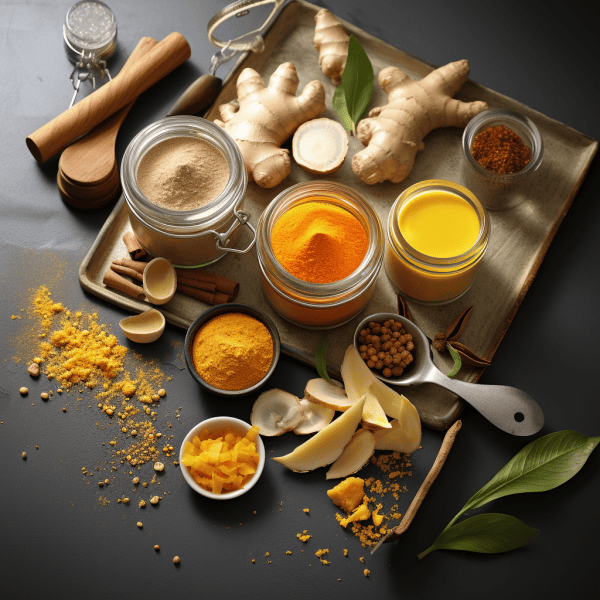What’s up, my spice-loving friends!
Have you ever reached for fresh ginger root only to find you’re all out?
Totally annoying when a recipe calls for it, right? No worries, I’ve got you covered.
And then you wondered, can ginger powder be substituted for fresh ginger?
As a busy cook and ginger fanatic, let me share the insider scoop on whether ginger powder can sub in for fresh.
Believe me, I’ve been in a pinch without ginger more times than I can count! Like the time I invited friends over for my famous homemade ramen, only to discover I was ginger-less.
Or when I volunteered to make a huge batch of ginger cookies for a bake sale.
Let’s just say I’ve gotten creative with substitutions in the kitchen.
After tons of trials and tribulations, I’m here to provide my first-hand wisdom on the great ginger powder versus fresh debate.
Can you swap in dried ginger when recipes call for fresh?
Are they equal substitutes?
Read on to uncover the spice sleuth’s secrets! Let’s turn kitchen mishaps into magic.
KEY TAKEAWAY
Can ginger powder be substituted for fresh ginger?
Yes, ginger powder can be substituted for fresh ginger in recipes (1), but keep in mind that the flavor and intensity may differ.
Start with a smaller amount of ginger powder and adjust according to taste.
Substituting Fresh Ginger with Powdered: Tips and Considerations
When to consider substituting fresh ginger with powdered
Have you ever been all set to make a delicious recipe only to realize you’re fresh out of fresh ginger?
I’ve totally been there!
As a busy home cook and ginger lover, let me dish on when it’s alright to swap in ground ginger for fresh.
First, powdered ginger works fine as a sub when you only need a teaspoon or two in baked goods like cookies or cakes.
The flavor won’t be exactly the same, but you likely won’t notice a huge difference.
Powdered ginger can also work for marinades, dressings, and other recipes where ginger is not the star player.
The key is using a light hand so the texture isn’t off.
But for recipes where ginger is front and center like ginger tea, stir fries, or pickled ginger, stick to fresh for the full impact.
Factors to keep in mind when making the substitution
When swapping ground ginger for fresh, keep these factors in mind:
- Use less powdered – it’s more concentrated than fresh
- Add it gradually and taste as you go
- Expect a drier, more one-note flavor lacking freshness
- Powder may clump if not mixed in properly
- Reduce cook time as dried ginger cooks faster
- For baking, allow time for ground ginger to rehydrate
Start with half the amount of powdered ginger called for in fresh ginger recipes then tweak to your liking.
Proper ratio for substituting fresh ginger with ginger powder
As a general rule, use:
- 1 teaspoon ground ginger for every 1 tablespoon freshly grated ginger
- Or 1/8 teaspoon powdered ginger for every 1 inch of fresh ginger root
But your tastebuds are the best judge. Trust your senses!
How the flavor and aroma may vary between fresh and powdered ginger
Since fresh ginger is a whole root full of juices and oils, it has a robust, bright flavor with a little spicy kick and lemony brightness.
Ground ginger has a drier, flatter taste (2). The spicy notes and citrus liveliness mellow out.
Fresh ginger also has a distinctly pungent aroma that powdered lacks.
So while powder adds a warm ginger essence, fresh ginger really can’t be duplicated.
Use fresh when you can to unlock that full flavor dimension!
Best Ginger Substitutes for Baking and Cooking
Exploring suitable alternatives for fresh ginger in various dishes

For ginger tea or broths, simmer thinly sliced citrus peels like orange or lemon for mild brightness.
The citrus notes can mimic some of ginger’s lemony essence.
Add a light hand so the citrus doesn’t overwhelm.
In stir fries and savory dishes, a dash of garlic, onion, or chili pepper flakes roughly mimic the punch of fresh ginger.
Sauteing the aromatics boosts their impact.
But expect a different flavor, not an exact ginger replica.
For baked goods like gingerbread, snickerdoodles, or molasses cookies, warming spices like pumpkin pie spice, cinnamon, nutmeg, or allspice provide some similar warmth.
Use a blend in small amounts to create a nice complexity.
Ground ginger as a primary substitute in baking
Replacing fresh ginger with ground ginger works best in baked goods where ginger is not the primary star.
Cookies, cakes, and breads handle the swap well.
Use about 1/2 tsp ground ginger for each tbsp freshly grated to account for potency.
And allow the powder to fully rehydrate in the batter or dough for full-bodied flavor.
Allspice, cinnamon, nutmeg as baking-only alternatives
In recipes like gingerbread, gingersnaps, or carrot cake, a blend of allspice, cinnamon, and nutmeg can create a nice ginger-esque synergy.
Use a ratio of 2:2:1 and add gradually until you achieve a well-rounded warmth.
But limit this spice blend substitute to baking applications only.
The flavor profile won’t work for savory dishes.
The takeaway – while no substitute can fully mimic fresh ginger’s unique zing, powdered ginger and other warming spices can still add that comforting ginger essence in a pinch when fresh roots are not available.
Don’t be afraid to experiment with proportions and combinations.
Your tastebuds will guide you!
Ground Ginger vs. Fresh Ginger: Which to Use When
Understanding the differences between ground ginger and fresh ginger

Have you ever wondered about the differences between ground dried ginger and fresh ginger root? As a ginger fanatic, let me break it down.
Fresh ginger is the whole unpeeled root, full of spicy oils and juices.
It has a robust, bright flavor with lemon and pepper notes.
Fresh ginger also has a strong, distinctive aroma.
Ground dried ginger is simply the dried, powdered root.
It has a muted, flat taste lacking the spicy kick and citrusy essence of fresh ginger.
And it does not have a strong scent like the fresh stuff.
While ground ginger adds warmth, using fresh ginger really maximizes that unique spicy brightness we know and love!
Benefits and drawbacks of using ground ginger in different dishes
Ground ginger works well in baked goods where ginger is not the star flavor.
But it may clump if not mixed properly.
In stir fries, dressings, and other recipes where ginger shines, fresh is far superior.
Dried ginger lacks ginger’s signature punch.
However, ground ginger can work in a pinch when fresh is unavailable.
Just use less, since powder is very concentrated.
When ground ginger is a suitable replacement and when fresh ginger is essential
Ground ginger suffices as a replacement when you only need 1 teaspoon or less, like in cookies.
But for ginger-centric dishes like tea, broth, or stir fries, fresh ginger is a must for full flavor.
When in doubt, opt for fresh to really make the ginger zing! But ground ginger adds a passable essence in a bind.
Tips for adjusting quantities when substituting ground ginger for fresh ginger

As a general rule:
- Use 1 tsp ground ginger for every 1 tbsp grated fresh ginger
- Use 1/8 tsp powdered ginger for every 1 inch of fresh root
Since ground ginger is extra concentrated, begin with half the amount of powdered ginger called for in fresh ginger recipes.
Then increase to taste. Trust your tastebuds!
Ginger Powder vs. Fresh Ginger: Health Benefits and Usage
Comparing the nutritional content of ginger powder and fresh ginger
Both forms contain antioxidants and compounds linked to health benefits.
But fresh ginger has higher levels since it’s the whole, unprocessed root.
Fresh ginger also retains the plant’s natural oils, enzymes, and juices which get depleted during drying. This maximizes nutritional potency.
So while ground ginger contains helpful compounds, fresh ginger packs a more powerful nutritional punch.
Potential health benefits associated with both forms of ginger
Studies link both ground and fresh ginger to several health perks like:
- Reduced nausea, motion sickness, cramps, and indigestion – Compounds in ginger may help relax the stomach and intestines. This eases many types of digestive woes.
- Decreased inflammation and arthritis pain – Ginger contains anti-inflammatory compounds like gingerols that may reduce joint pain and swelling. This helps conditions like osteoarthritis.
- Improved heart and brain health – Antioxidants in ginger may boost circulation and cognition. More research on effects is needed.
But the higher nutrient levels in fresh ginger mean it may offer even greater therapeutic effects than ground.
However, both forms provide proven benefits.
How to maximize the benefits of ginger in cooking and wellness
To get the most out of ginger’s nutrients and compounds:
- Use fresh ginger more often in cooked dishes, drinks, and remedies – Harness its full nutritional power!
- Add freshly grated ginger to smoothies or juice it – Ingest it raw to preserve nutrients.
- Infuse sliced fresh ginger into warm water to make ginger tea – Let it steep to extract the most benefits.
- Lightly cook fresh ginger to retain more nutrients than prolonged cooking – Steam, stir-fry, or bake briefly.
Choosing the right form of ginger based on culinary and health considerations
For peak ginger flavor and maximum nutrition, fresh ginger really is best.
But ground ginger can suffice when fresh is totally unavailable.
Let your specific recipe needs, health goals, and ginger accessibility guide you.
There’s no wrong choice! With its unique kick and benefits, ginger in all forms is a tasty way to spice up health.
Conclusion
There you have it, folks – the lowdown on substituting ginger powder when you’re lacking that fresh rhizome.
While powder can work in a pinch, fresh ginger really can’t be replicated exactly.
But with the right ratio adjustments and uses, powder lets you carry on the gingery flavor.
I hope my kitchen tales have prepped you to improvise when your recipes call for ginger and you come up short.
No more missing out on ginger goodness!
With the guidelines I’ve shared, you can adapt and substitute dried ginger confidently.
A little creativity saves the day.
The next time a recipe calls for fresh ginger, review these tips before panicking.
And maybe keep an extra stash of ground ginger on hand just in case.
Don’t let a lack of fresh ginger stop you from savoring sweet and savory creations.
Now you’ve got the inside scoop to spice things up!
References
- https://www.bhg.com/recipes/how-to/cooking-basics/ginger-substitute/#:~:text=Fresh%20or%20Dried%20Ginger&text=Converting%20fresh%20ginger%20to%20ground,fresh%2Dgrated%20ginger%20in%20recipes.
- https://www.simplyrecipes.com/know-your-spices-ground-ginger-5207482#:~:text=What%20Does%20Ground%20Ginger%20Taste,of%20the%20flavor%20of%20fresh.
Related Articles
- https://bowlakechinese.com/ginger-substitute-in-baking/
- https://bowlakechinese.com/ginger/
- https://bowlakechinese.com/low-sodium-chinese-food-products/
Was this helpful?

I am a skilled chef assistant with a passion for Asian cuisine, I have honed my craft through formal training at At-Sunrice GlobalChef Academy and years of experience in the culinary industry. I have extensive knowledge of cooking techniques and herbs and spices, with a particular focus on traditional Chinese dishes. I’m also an author of the book “Delicious Keto Low Carb Chinese Food for Busy Moms and Fitness Enthusiasts” which is sold on Amazon. On my blog, bowlakechinese.com, I share my expertise in Asian cuisine and provide tips and recipes for those interested in low carb Chinese cuisine.

